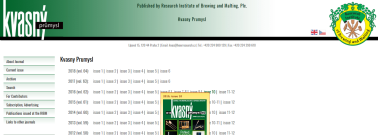Beer Brewing and Malting in the Royal Town of Nymburk in the Pre-White Mountain Period
DOI:
https://doi.org/10.18832/kp2016013Keywords:
brewing, malting, Royal Town, Nymburk, Pre-white Mountain periodAbstract
The first mention of beer brewing in the royal town of Nymburk is to be found in a charter by King John of Luxembourg of 1327. The so-called one-mile law (mílové právo), which gave the town the monopoly of brewing beer in the region, was restricted only by the St Wenceslas Agreement of 1517. This, however, did not mean an end of hegemony, because the neighbourhood’s aristocracy was not able to compete in beer brewing. The situation changed in 1548 after the town properties were confiscated; the brewers of the town of Nymburk had no longer grain from town’s farmsteads at their disposal and were forced to buy wheat and barleycorn from neighbouring demesnes. The volume of production was decreasing up to the beginning of the Thirty Years’ War, though not as abruptly as it would correspond to the situation at that time. It was so, because the neighbouring lordships were lacking the necessary production capacities. The potentials of lordship breweries – of the towns of Lysá and Poděbrady in particular – were gradually able to compete with the royal town of Nymburk. The latter town lost its privilege during the Thirty Years’ War.







